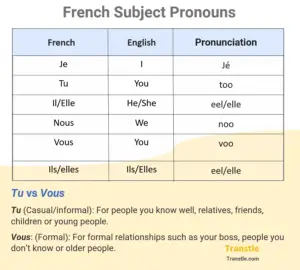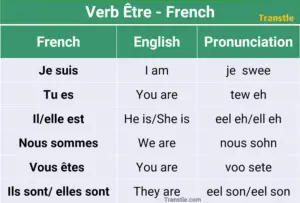Tu and Vous in French: Uses, Differences & Examples
Tu and vous in French
In French, there are two ways to refer to the second-person singular (you): “tu” and “vous”. “Tu” is used in informal situations or when speaking to someone with whom you have a close relationship, such as family or close friends. “Vous” is used in formal situations, or when addressing someone with whom you are not familiar or who is in a position of authority, such as a boss or teacher.
It’s important to understand the appropriate context for using “tu” or “vous” in French, as using the wrong pronoun can be considered impolite or disrespectful. In general, it’s safer to use “vous” until the other person invites you to use “tu”.
See also: French Subject Pronouns
When to use Tu and vous and their differences
In French, the use of “tu” and “vous” is governed by different criteria, such as age and the level of formality in the relationship between the people communicating.
According to the level of formality
- “Tu” is used in informal situations with people who are well-known, such as friends, family, or people of the same age.
- “Vous” is used in more formal situations, such as with bosses, teachers, or older people.
- In very formal situations, such as in a business or professional context, the use of “vous” is preferable to demonstrate respect and courtesy. (1)
Exceptions: When you do not know the person or if you are relatively young, you can use “tu” if the person is your age or younger, especially in non-professional settings. Children, teenagers, and young adults are the ones who do this more often.
According to age
Regarding age, children and young people usually use “tu” with people of their own age, regardless of whether they know them or not. With young adults, the use of “tu” is possible if there is a close relationship or trust. While with older or unknown adults, “vous” is generally used as a sign of respect and formality.
In case of doubt, it is recommended to use “vous” to avoid misunderstandings and demonstrate respect. It is better to be more formal in situations where you are unsure of the level of trust or closeness in the relationship.

Examples of sentences with tu y vous
Tu es mon ami. – You are my friend.
Tu aimes le chocolat. – You love chocolate.
Tu viens ce soir? – Are you coming tonight?
Vous êtes mon professeur. – You are my teacher.
Vous habitez où? – Where do you live?
Vous voulez boire quelque chose? – Do you want to drink something?
Dialogue
Hi nephew, do you eat mangoes? I bought some. – Salut neveu, est-ce que tu manges des mangues ? J’en ai acheté. Yes aunt, and you? – Oui tante, et vous ? Mom, did you buy the watermelon for the fruit salad? – Maman, est-ce que vous avez acheté la pastèque pour la salade de fruits ? Yes son, and did you buy the soda? – Oui fils, et est-ce que tu as acheté le soda ? |
How to conjugate tu and vous in French
In French, the conjugation of verbs changes depending on whether you use “tu” or “vous”. The rules are as follows:
a) Regular verbs with “tu” and “vous”
- Verbs tend to end in -es when using “tu”.
- Verbs end in -ez when using “vous”. (2)
Examples
- You study a lot (informal) – Tu étudies beaucoup.
- You study a lot (formal) – Vous étudiez beaucoup.
- You speak French (informal) – Tu parles français.
- You speak French (formal) – Vous parlez français.
b) Verbs of the second group with “tu” and “vous”
- “Tu” uses the ending -is.
- “Vous” uses the ending -issez. (3)
Examples:
- Tu finis – You finish.
- Vous finissez – You finish.
c) Irregular verbs with “tu” and “vous”
- The conjugation changes with each verb. (4)



